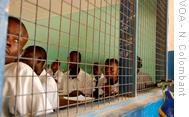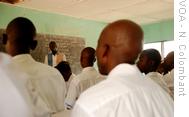voa标准英语2008-Poor Marks, High Fees Keep Students Away in Sier
时间:2019-01-13 作者:英语课 分类:VOA标准英语2008年(十二月)

Schoolgirls in Makeni, Sierra Leone
Mohamed is a high-school dropout who drives a motorcycle taxi, known as an okada, to get by.
Rebels killed his father during the decade long civil war that began in 1991.
Mohamed says he was previously 4 being sponsored as a high-school student by Catholic priests in the northern town of Kabala. But when they recently returned to Europe, he says he had no choice but to look for money to survive.

Students say fees are too high
Riding a motorcycle he rents, he makes a few dollars a day. But, he says, it is not enough to pay for school fees. With textbooks and school supplies, these can run to more than $100 per year.
"I am saving the money but the money will not be enough. So if I pay the fee, how can I support myself again. And the money will be less, so there is no way. So I only strike [work] for my feeding and to clothe myself, to take care of my health," he said.
A former student comes into the office of school administrator 1 Victor Campbell, looking for his results. Campbell says results from the last school year were some of the worst in the country's history, and he is still trying to find out why.
"These are some of the questionnaires I put across for the poor performance of candidates. So I tried to prepare some questions. At least we will know from everybody, not only the teachers, the general public and education officials, principals and even the students, so that we will see what is the reason why we have such poor results. So at least when I compile them, we can find a way forward," he said.
Until he gets his answers, though, Campbell, the exam controller for northern Sierra Leone, is putting most of the blame on students.
"The pupils, of course, they are not actively 5 engaged in their academic work. They do not study, in fact [that is] one of the complaints we have from the various principals. I am sure if they were going to school, and they were concentrating on their studies, they would [do] better," he said.

Students say teachers sell notes
But students, like those at the Sierra Leone Muslim brotherhood 6, blame teachers. They say teachers do not really teach in class, and that they sell class notes so only those who have extra money can buy the material needed to pass exams.
One 18-year-old female student in her final high school year says it is very challenging to stay in school and succeed.
"The teachers, some teach, some do not teach properly. It is very difficult," she said. "We are thinking about this poverty. Most of our parents do not provide for us the materials so that is why it is so difficult. If you come to school, if your teachers do not teach, if you do not have money to buy books it is difficult for you to go through your exams and pass."
History teacher Aime Camara acknowledges poorly-paid teachers try to make extra money off students. He says a compromise should be found, so children can learn and teachers can earn a living.
"Sometimes some teachers print pamphlets, they only dish out these pamphlets and they collect the money, but they fail to go into these pamphlets so that they can explain the difficult areas for the children. And if that happens, of course, the children will not be able to get anything out of it," he said.
Despite all these challenges, there are success stories.
Al-Hassan Kamara is a second-year student at Makeni's Fatima Institute. When he was nine, he saw rebels execute his father, a diamond miner, in front of him.
He fled to refugee camps in Guinea, where he went to classes taught by aid workers.
"It is because of my effort in school, because I was clever in school, so someone went for me in Guinea and brought me back to Sierra Leone," he said.
Now, a friend in Makeni, an okada driver, helps him pay his school fees.
"He knows that in the future, if he helps me, I will help him because I am very clever in my books," he said. "He too wants to go to school but because there is no support, he has to help me so that both of us we do not sit down like that. I will go further and help him in return later."

Students say exams are too difficult
Even though he is succeeding, Kamara says it is a constant struggle.
"Looking to higher [learning] institutions, they are making things difficult. The exams are very tedious. No one can get ahead. For the school fees, they are very, very, high. So there is a need to change all the system so that people will be more in schools, not less. There should be a lot of scholarship grants to students so that there will be more intellectuals in the country," he said.
Kamara also complains that elites 7 send their children to study abroad, rather than trying to improve their country's schooling 8 system.
"The ministers, the president's people, they are all taking their children to go and learn out[side], they are leaving the country. There is a need for a change in the education system here. They are making their own children richer in education and leave others, the lower people. That is not fine for the development of the country," he said.
Kamara says he believes his own father would be proud of him.
"He normally beat us to go to school. I was struck at that age. He would take things from me, trying to chase me to school, but I was stubborn. But now I realize what he was doing, it was very nice for me," he said.
Kamara says his grandparents were illiterate 9, and that despite the poverty and war of his generation, he is already much more educated than they were, which is what he hopes for all Sierra Leoneans.
- The role of administrator absorbed much of Ben's energy.行政职务耗掉本很多精力。
- He has proved himself capable as administrator.他表现出管理才能。
- He had administrators under him but took the crucial decisions himself. 他手下有管理人员,但重要的决策仍由他自己来做。 来自辞典例句
- Administrators have their own methods of social intercourse. 办行政的人有他们的社交方式。 来自汉英文学 - 围城
- There is a high dropout rate from some college courses.有些大学课程的退出率很高。
- In the long haul,she'll regret having been a school dropout.她终归会后悔不该中途辍学。
- The bicycle tyre blew out at a previously damaged point.自行车胎在以前损坏过的地方又爆开了。
- Let me digress for a moment and explain what had happened previously.让我岔开一会儿,解释原先发生了什么。
- During this period all the students were actively participating.在这节课中所有的学生都积极参加。
- We are actively intervening to settle a quarrel.我们正在积极调解争执。
- They broke up the brotherhood.他们断绝了兄弟关系。
- They live and work together in complete equality and brotherhood.他们完全平等和兄弟般地在一起生活和工作。
- The elites are by their nature a factor contributing to underdevelopment. 这些上层人物天生是助长欠发达的因素。
- Elites always detest gifted and nimble outsiders. 社会名流对天赋聪明、多才多艺的局外人一向嫌恶。
- A child's access to schooling varies greatly from area to area.孩子获得学校教育的机会因地区不同而大相径庭。
- Backward children need a special kind of schooling.天赋差的孩子需要特殊的教育。
- There are still many illiterate people in our country.在我国还有许多文盲。
- I was an illiterate in the old society,but now I can read.我这个旧社会的文盲,今天也认字了。